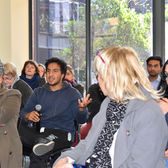
NEUROSCIENCE RESEARCH LABORATORY
WITS NeuRL



BRAIN MATTERS SEMINARS
The past, present and future of
Neuroscience in southern Africa
University of Cape Town
Dr Mark Solms
Solms is the Director of Neuropsychology at the University of Cape Town. He is President of the South African Psychoanalytical Association, member of the British Psychoanalytical Society and Honorary Member of the New York Psychoanalytic Society. He is the Research Chair of the International Psychoanalytical Association, Director of the Science Department of the American Psychoanalytic Association and Co-Chair of the International Neuropsychoanalysis Society. His selected writings were recently published as The Feeling Brain (2015). He is the editor of the forthcoming (2017) Revised Standard Edition of the Complete Psychological Works of Sigmund Freud (24 vols) and the Complete Neuroscientific Works of Sigmund Freud (4 vols).
SEMINAR
SUMMARY
Neural Mechanisms of Dreaming
Sahba Besharati
Introduction

Sahba Besharati is a Postdoctoral Research Fellow at the University of the Witwatersrand (Wits). Dr Besharati’s research integrates neuroimaging, neuropsychological and experimental methods to investigate disorders of self-consciousness and awareness following brain damage.
Michael Pitman

Introduction
Dr Michael Pitman completed honours degrees in Applied Psychology and Philosophy at the University of the Witwatersrand before reading for an M.Phil in Philosophy at Cambridge University. He has published papers on consciousness, the philosophy of psychopathology, psychoanalysis, free will, agency, imagination, and teaching and learning.
The third seminar in the series was held on Friday 18th August 2017. The presenter, Professor Mark Solms, Director of Neuropsychology at the University of Cape Town, spoke on: ‘The neural mechanisms of dreaming’.
The discovery of the brain mechanisms of REM sleep in the 1960s and 70s suggested that dreaming is a meaningless physiological state. More recent findings suggest otherwise: dreams are generated by a network of forebrain structures responsible for specific memory and motivational functions. This lecture reconsidered the old Freudian theories in light of these new findings.



















